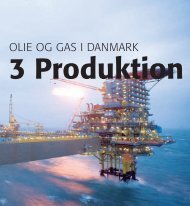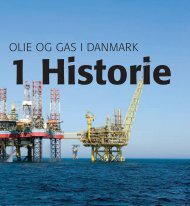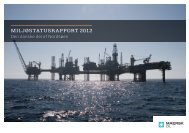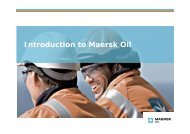Environmental statement - Flyndre and Cawdor - Maersk Oil
Environmental statement - Flyndre and Cawdor - Maersk Oil
Environmental statement - Flyndre and Cawdor - Maersk Oil
Create successful ePaper yourself
Turn your PDF publications into a flip-book with our unique Google optimized e-Paper software.
Antifouling coating<br />
on vessels<br />
Discharges<br />
Vessel movements<br />
International Convention on the Control of<br />
Harmful Antifouling Systems on Ships 2001; EC<br />
Regulation 782/2003 on the Prohibition of<br />
Organotin Compounds on Ships<br />
The Merchant Shipping (Anti‐Fouling Systems)<br />
Regulations 2009<br />
EC Directive 76/464<br />
Surface Waters (Dangerous Substances)<br />
(Classification) Regulations 1998<br />
OSPAR <strong>and</strong> Helsinki Conventions<br />
The Offshore Petroleum Activities (<strong>Oil</strong><br />
Pollution Prevention <strong>and</strong> Control) Regulations<br />
2005 (as amended 2011)<br />
(as amended by the Energy Act 2008<br />
(Consequential Modifications) (Offshore<br />
<strong>Environmental</strong> Protection) Order 2010)<br />
(replaced the Prevention of <strong>Oil</strong> Pollution Act<br />
1971)<br />
Offshore Chemicals Regulations 2002 (as<br />
amended 2011) (as amended by the Energy<br />
Act 2008 (Consequential Modifications)<br />
(Offshore <strong>Environmental</strong> Protection) Order<br />
2010) PON 15c<br />
International Regulation for Preventing<br />
Collisions at Sea 1972 (COLREGS) (as amended<br />
1981, 1987, 1989, 1993, 2001 <strong>and</strong> 2007)<br />
The 2010 amendments primarily implement provisions concerning the sulphur content of marine fuels<br />
<strong>Flyndre</strong> <strong>and</strong> <strong>Cawdor</strong> <strong>Environmental</strong> Statement<br />
Appendix A - Register of <strong>Environmental</strong> Legislation<br />
It was proposed by the International Convention on the Control of Harmful Antifouling Systems on Ships that the use of tributyltin (TBT)<br />
will be banned on new vessels from 2003 with a total ban on all hulls from 2008. However, currently, in the UK, the use is only restricted<br />
under the Surface Waters (Dangerous Substances) (Classification) Regulations, 1997. Additionally, it is listed as a priority hazard<br />
substance under the Water Framework Directive, for priority action under the OSPAR <strong>and</strong> Helsinki Conventions <strong>and</strong> it’s sale <strong>and</strong> use are<br />
restricted under the Control of Pesticides Regulations (as amended).<br />
EC Regulation 782/2003 prohibits ships from having organotin compound based anti‐fouling paints applied to their hulls or other<br />
external surfaces, <strong>and</strong> it establishes a survey <strong>and</strong> certification regime in relation to anti‐fouling systems. The Merchant Shipping (Anti‐<br />
Fouling Systems) Regulations 2009 implements the EC Regulation into UK law.<br />
EC Directive 76/464 deals with pollution cause by certain dangerous substances discharged into the aquatic environment. The Surface<br />
Waters (Dangerous Substances) (Classification) Regulations 1998 prescribe a system for classifying the quality of inl<strong>and</strong> freshwaters,<br />
coastal waters <strong>and</strong> relevant territorial waters with a view to reducing the pollution of those waters by the dangerous substances within<br />
List II of EC Directive 76/464.<br />
Regulator: DECC<br />
As with drilling, discharges contaminated with reservoir oil during installation require an OPPC permit. These can be either term permits<br />
or life permits depending on the duration of the discharge. Under the 2011 amendments to the OPPC, a permit is now required for<br />
discharges from pipelines. An OPPC permit is not required if the discharge originated from a vessel covered by the Merchant Shipping<br />
(Prevention of <strong>Oil</strong> Pollution) Regulations. Under the Energy Act 2008 (Consequential Modifications) (Offshore <strong>Environmental</strong> Protection)<br />
Order 2010, permits now extend to CCS activities.<br />
A permit is required for discharge of oil to sea <strong>and</strong> is obtained from DECC. Specific monitoring <strong>and</strong> reporting requirements will be<br />
included on each permit. Reporting is via the <strong>Environmental</strong> Emissions Monitoring System (EEMS).<br />
Regulator: DECC<br />
Under these Regulations, offshore pipeline installations need to apply for permits to cover both the use <strong>and</strong> discharge of chemicals.<br />
Under the 2011 amendments, this applies to both operational <strong>and</strong> non‐operational emissions of chemicals, for example, accidental leaks<br />
or spills. The permits are applied for through the PON15c online application form (UKoilPortal). The application requires a description<br />
of the work carried out, a site specific EIA <strong>and</strong> a list of all the chemicals intended for use <strong>and</strong> or discharge, along with a risk assessment<br />
for the environmental effect of the discharge of chemicals into the sea. The permit obtained may include conditions.<br />
Permits now extend to CCS activities under the Energy Act 2008 (Consequential Modifications) (Offshore <strong>Environmental</strong> Protection)<br />
Order 2010.<br />
Regulator: IMO<br />
The COLREGs are designed to minimise the risk of vessel collision at sea <strong>and</strong> apply to all vessels on the high seas. They include 38 rules<br />
divided into five sections:<br />
A ‐ 14 D/4114/2011








